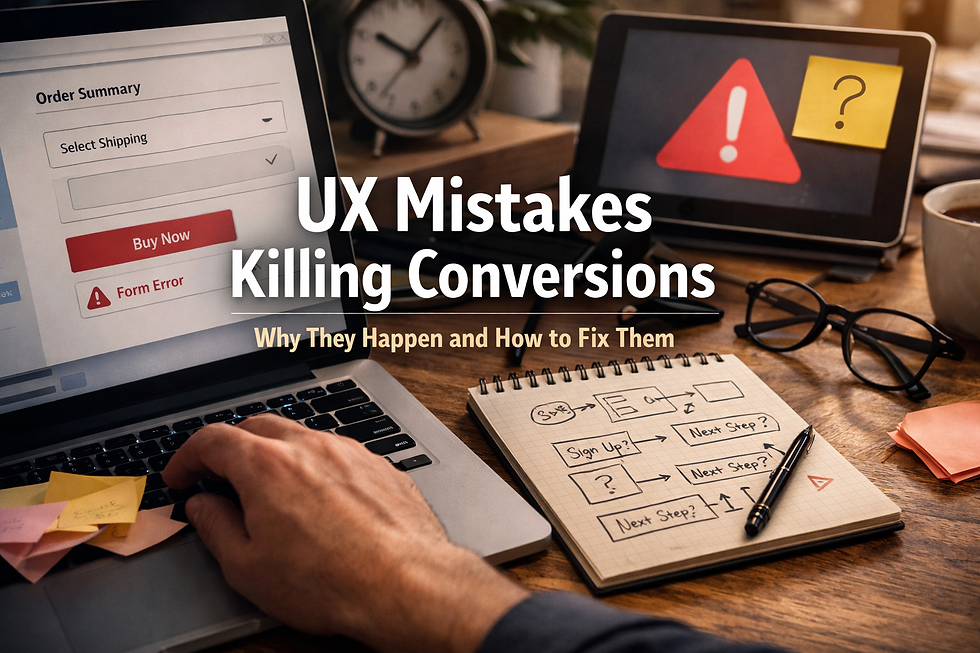SEO vs. PPC: Choosing the Right Path for Your Business
- Oct 7, 2024
- 4 min read

When it comes to growing your business online, SEO and PPC are two of the most well-known digital marketing strategies. Both can help increase visibility, but they take very different approaches. If you’re wondering which one to invest in, or if it’s possible to combine them for the best results, this blog will guide you through their unique benefits and how they fit into your overall marketing strategy.
Understanding SEO: The Organic Route
SEO, or Search Engine Optimization, is the art and science of getting your website to rank higher on search engines like Google. When done correctly, SEO helps you appear at the top of the results when people search for terms related to your business. The key here is organic traffic — visitors who find your site naturally without you paying for every click. SEO focuses on improving your site’s relevance, authority, and user experience, all of which contribute to better rankings over time.However, SEO is more than just picking the right keywords. It involves:
Content optimization: Crafting informative and engaging content.
Technical SEO: Ensuring your site is technically sound, fast, and mobile-friendly.
Link building: Earning high-quality backlinks to improve your site’s authority.
While SEO takes time to show results, the long-term rewards can be worth the investment, especially for businesses looking to build a solid foundation of organic traffic.
The Power of PPC: Instant Visibility
If SEO is the slow burn, PPC (Pay-Per-Click) advertising is the rocket ship. With PPC, you can buy ad space on platforms like Google, Facebook, or Instagram, and your ad appears when users search for or browse related content. The main advantage here is speed — you get instant visibility as soon as your campaign goes live.PPC gives you a high degree of control:
Targeted reach: You can choose exactly who sees your ads based on location, demographics, interests, and behaviors.
Budget flexibility: You can set daily or monthly limits, ensuring you never spend more than you're comfortable with.
Actionable data: PPC provides detailed analytics that show how well your ads are performing, allowing for quick adjustments to maximize ROI.
However, unlike SEO, PPC is a pay-to-play strategy. Once you stop paying, your ads disappear, and so does your traffic.

SEO and PPC: Not a Case of Either/Or
The real question is often not about which strategy is better, but rather how you can leverage both SEO and PPC to meet different business goals. Let’s consider a few scenarios:
Launching a new product: PPC can generate instant traffic to your landing pages while SEO helps establish long-term relevance around product-related keywords.
Competing in a crowded space: If your competitors dominate the organic search results, PPC can help you bypass them in the short term. But SEO should still be in play to gain ground over time.
Testing content and keywords: PPC offers quick insights into what works. You can test different ads and landing pages to see what converts best, then focus your SEO efforts on those high-performing terms.
Blending SEO and PPC for Maximum Impact
The best digital marketing strategies don’t pit SEO and PPC against each other. Instead, they blend both methods to achieve the greatest impact. Here’s how a combination can work in your favor:
Dominate the search results: Appearing in both organic and paid results increases your visibility and builds trust with potential customers. It gives the impression that your business is authoritative and credible.
Data-driven decisions: The data from your PPC campaigns can fuel your SEO strategy. By understanding which keywords drive the most conversions, you can prioritize your SEO efforts and target those terms for long-term gains.
Smart budgeting: You can allocate your budget strategically by focusing your PPC efforts on high-intent searches while working to improve your organic rankings over time. Once your SEO begins to bear fruit, you can reduce your PPC spend and still capture the same audience.
The Long and Short of It
When deciding between SEO and PPC, the key is not choosing one over the other, but understanding how they complement each other. SEO builds your brand’s long-term credibility, while PPC provides the immediate traffic boost that can drive sales and visibility in the short term.
Whether you’re looking for instant results or building a steady stream of organic traffic, SEO and PPC together can help you create a well-rounded digital marketing strategy that drives success for your business now and into the future.
Expert Insights:
SEO vs. PPC: SEO focuses on driving organic traffic through long-term strategies like content optimization, technical improvements, and link building. PPC provides instant visibility by placing paid ads on search engines and social platforms, offering immediate results but at a cost.
Unique Benefits of SEO: SEO is ideal for building long-term visibility and credibility. It enhances brand authority and drives organic traffic, but it requires time and consistent effort to deliver results.
Advantages of PPC: PPC offers targeted reach, fast results, and actionable data, making it an effective tool for short-term campaigns and gaining immediate traffic. However, it requires ongoing investment.
Combining SEO and PPC: Rather than choosing between SEO and PPC, businesses can benefit from using both strategies simultaneously. SEO builds sustainable traffic, while PPC offers immediate boosts, especially when launching new products or competing in saturated markets.
Key Takeaways:
SEO for Long-Term Success: SEO is a long-term strategy that improves organic visibility and credibility, making it essential for sustained growth.
PPC for Immediate Impact: PPC provides fast results by targeting specific audiences with paid ads, but the traffic stops when you stop paying.
Blending SEO and PPC: Combining both strategies creates a balanced approach that delivers short-term results while building a foundation for long-term success.
Data-Driven Optimization: PPC data can inform SEO efforts, allowing businesses to prioritize high-converting keywords and optimize their content accordingly.


